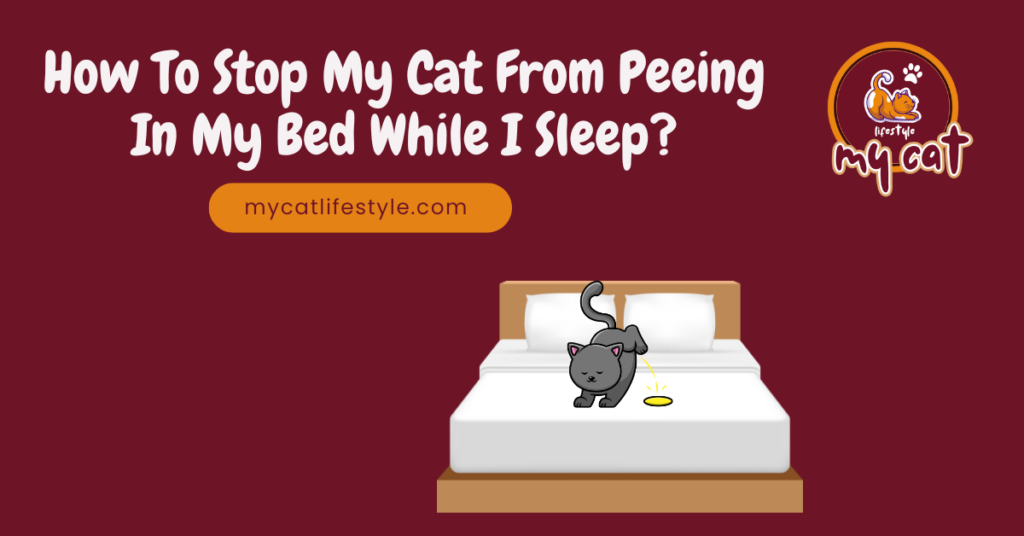Why Does My Cat Pee On My Bed While I Sleep?

If your cat pees on your bed while you sleep, you must figure out why. If you discover that it’s your problem and not your cat’s, you may experience:
- Working long hours
- In extended absence, as follows
When your litter box-trained cat suddenly starts peeing outside its litter pan, it is never normal. Be aware of your cat’s peeing or pooing on the floor near its litter pan. Can your other pets or cats pose a threat to your kitty when they must use the litter pan? During the past 30 years of caring for cats in my home, I permanently housed three to six cats at a time. My cats live in peace together. There have always been one or two cats who, on occasion, pick on another cat when they are in the litter pan.
While in the litter pan, the targeted cat may feel vulnerable and nervous, so it begins to pee or poop on the floor. In my half bath, one of the litter pans is close to the toilet, so this cat may poop on the floor instead of in the litter pan if it feels more secure. A cat is an excellent mimic.
What is the purpose of the bathroom if not for cat parents to pee or poop in it? As cats watch their owners, they learn from them. Cats know the bathroom is the best place to relieve themselves. You should clean your cat’s litter pan at least twice a day, otherwise your cat may find another place to poop or pee, such as your bed. It is your fault, not your cat’s.
Why Does My Cat Pee On My Bed While I Sleep?
When your cat pees on your bed while you are asleep, this becomes a frustrating and irritating situation. Cats may indicate that they need assistance due to underlying behavioral or health issues. You would have to admit that there is no better way to gain your attention. This is never the time to be hostile, angry, or yell at your kitten.
I have been involved in cat rescue and care for over 40 cats for over 30 years. I have never had more than six animals in my home at one time, and I must admit that I have never encountered this particular issue. When my cat peed or pooped inappropriately, the first thing I did was to have a urine test performed to determine whether he had a urinary tract infection.
After a veterinarian was unable to identify a medical reason why my litter-box trained cat was suddenly peeing or pooping outside the litter box, I began to investigate possible behavioral issues and changes in my home. Read about some of the possibilities listed below and begin eliminating them. Add your own suggestions as well.
In order to determine why your cat pees on your bed, you must become a medical and behavioral investigator. Undoubtedly, you will not be able to find a solution overnight.
However, if you start eliminating reasons one at a time, you will soon discover why your cat behaves in this manner. If you love your furry friend, you may wish to conduct this investigation. If you examine yourself carefully, you may find that the problem is not your cat, but rather you.

How To Stop My Cat From Peeing In My Bed While I Sleep?

The initial step in addressing this issue is to eliminate any potential health concerns, such as a Urinary Tract Infection (UTI).Have you ensured the litter box is clean before bedtime? For my six cats, I maintain four litter boxes. Despite my vet recommending a total of 12 based on the number of cats, I manage with what I have. Among these, two are extra-large, essentially counting as four due to their size, which gives me a sort of six-box setup across my home.
I opt for high-quality clumping litter over clay, topping it off as necessary. I make it a point to scoop the boxes every morning, every night before bed, and periodically throughout the day. Given cats’ superior night vision, I’ve also placed motion-activated night lights near each box for added convenience.
Consider your cat’s preferences and needs:
- Does your cat prefer a covered or an open litter box?
- Is the current box appropriately sized for your cat?
- If your cat is older, could arthritis be making it hard to access the box?

I recall a dear old cat of mine with severe arthritis; I placed a step to help her into the box, and eventually, when even that became too much, I laid out large absorbent pads for her. It was crucial to adapt to her needs without frustration.
Understanding and patience are key — it’s about finding and addressing the root cause of their behavior. Every cat has its own litter preference, making it essential to try various types. Steer clear of clay litter due to its potential health risks, including increasing the chance of urinary tract infections.
Have you experimented with alternatives like crystal, pine, or unscented litter? Also, consider if you’re using a litter box liner, as some cats find these uncomfortable. Cats sometimes urinate on your bed as a way of combining their scent with yours, seeking a deeper connection.
Prolonged absences or limited interaction can lead to feelings of abandonment in your cat, heightening their anxiety. Enhancing playtime or allowing your cat more access to your sleeping area could mitigate this issue.
Consider these steps to discourage inappropriate urination:
- Position a litter box close to where you sleep.
- Introduce cat treats or place a small dish of their favorite food at your bed’s end, leveraging the principle that cats prefer not to soil where they eat.
- Immediately clean any accidents on your bedding to avoid repeat offenses. Reacting with frustration or anger will not resolve the behavior and could exacerbate your cat’s stress.
If these adjustments don’t yield improvement, a follow-up consultation with your veterinarian might unveil new strategies. It’s crucial to examine your daily routines and ensure that you’re not inadvertently contributing to the problem.

Should I Allow My Cat To Sleep With Me?

Consider the following pros and cons. If you decide to sleep with a cat, it is entirely up to you.
Cons:
The exclusion of your cat from your bedroom could worsen the situation, thereby exacerbating your cat’s insecurity.
- A cat is naturally nocturnal, and most of them are busy when you sleep. It is common for cats to keep their parents awake, and you are in need of sleep.
What is the problem with your cat peeing on your bed and waking you up, or do you sleep through the issue?
- You may get litter particles on your bed.
- If you have allergies, COPD, or respiratory illnesses, your cat may not sleep with you.
- It is possible to catch parasites, fungal infections, or bacterial infections from your cat. (rare)
It has never been a problem for me with my Daisy. I have been sleeping with her for more than six years. The night before Daisy, Shadow and Sammie slept with me until they crossed the Rainbow Bridge.

Pros
- When you sleep with your cat, both of you will feel secure. It was Sammie, God bless him, who saved us from a possible house fire one night.
- Have you noticed that your kitty is ill and needs your special attention?
- We tend to feel calmer when our cats fall asleep next to us.
- Cats are wonderful antidepressants, reducing loneliness, anxiety, and stress.
- According to cat researchers, sleeping with pets lowers blood pressure.
- A cat that sleeps with you promotes bonding, particularly if the cat is insecure because you are away for long periods of time. You may never get a chance to be in close proximity to your fur baby again.

Frequently Asking Question
Why is my cat peeing on my bed while I’m in it?
Your cat might be feeling stressed or seeking your attention. It’s their way of saying they need some extra love or there might be something wrong.
How do you fix cat pee in bed?
First, soak up as much pee as possible, then use an enzyme cleaner to break down the smell. Washing your bedding in hot water with vinegar can also help eliminate the odor.
Why did my cat pee on my pillow?
Your cat may have peed on your pillow to mix their scent with yours, showing they trust you deeply. It could also signal they’re stressed or have health issues.
What scent deters cats from peeing?
Cats generally dislike the smell of citrus, lavender, and peppermint. Spraying these scents around areas you want to keep cat-free can help deter them from marking.
Conclusion
If you’re wondering, “Why does my cat pee on my bed while I sleep?”, it’s crucial to understand this behavior signals a need for attention, whether it’s due to stress, medical issues, or seeking comfort through scent mixing. Addressing the root cause—be it health-related or emotional—requires patience, understanding, and sometimes a bit of detective work. Ensuring a clean, accessible litter box, maintaining a stress-free environment, and consulting with a vet for potential health issues are key steps. Remember, this behavior is a cat’s way of communicating, and with the right approach, you can help your feline friend feel more secure and stop unwanted peeing. Creating a harmonious living space for you and your cat enhances the bond you share and ensures peaceful nights ahead.





